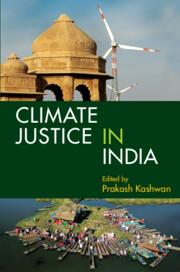Book contents
- Frontmatter
- Contents
- List of Poems and Artworks
- List of Tables
- List of Figures
- List of Abbreviations
- Preface and Acknowledgements
- 1 Introduction: Climate Justice in India
- 2 Urban Climate Justice in India
- 3 How Just and Democratic Is India’s Solar Energy Transition?: An Analysis of State Solar Policies in India
- 4 Extractive Regimes in the Coal Heartlands of India: Difficult Questions for a Just Energy Transition
- 5 Climate Justice Implications of the Relationship between Economic Inequality and Carbon Emissions in India
- 6 Climate Action Plans and Justice in India
- 7 Social Mobilizations for Climate Action and Climate Justice in India
- 8 Reimagining Climate Justice as Caste Justice
- 9 Intersectional Water Justice in India: At the Confluence of Gender, Caste, and Climate Change
- 10 Realizing Climate Justice through Agroecology and Women’s Collective Land Rights
- 11 Conclusion: Pathways to Policies and Praxis of Climate Justice in India
- About the Editor and Contributors
- About the Poets and Artists
- Index
7 - Social Mobilizations for Climate Action and Climate Justice in India
Published online by Cambridge University Press: 03 November 2022
- Frontmatter
- Contents
- List of Poems and Artworks
- List of Tables
- List of Figures
- List of Abbreviations
- Preface and Acknowledgements
- 1 Introduction: Climate Justice in India
- 2 Urban Climate Justice in India
- 3 How Just and Democratic Is India’s Solar Energy Transition?: An Analysis of State Solar Policies in India
- 4 Extractive Regimes in the Coal Heartlands of India: Difficult Questions for a Just Energy Transition
- 5 Climate Justice Implications of the Relationship between Economic Inequality and Carbon Emissions in India
- 6 Climate Action Plans and Justice in India
- 7 Social Mobilizations for Climate Action and Climate Justice in India
- 8 Reimagining Climate Justice as Caste Justice
- 9 Intersectional Water Justice in India: At the Confluence of Gender, Caste, and Climate Change
- 10 Realizing Climate Justice through Agroecology and Women’s Collective Land Rights
- 11 Conclusion: Pathways to Policies and Praxis of Climate Justice in India
- About the Editor and Contributors
- About the Poets and Artists
- Index
Summary
Introduction
In September 2019, more than 300 representatives of farmers’ organizations, trade union federations, indigenous people's organizations, fisher groups, women's organizations, environmental groups, and a few progressive political parties from Bangladesh, Nepal, Sri Lanka, and various parts of India met in Hyderabad. This four-day-long convention concluded with the founding of the South Asian People's Action on Climate Crisis (SAPACC). The delegates voiced their concerns about the anticipated effects of the impending climate crisis and ‘critiqued the inadequacy of governments’ policies’ (Adve 2019). In the past, India's climate activists focused almost exclusively on multinational corporations and the governments of industrialized countries, who are responsible for causing the climate crisis. They argued that questioning the Indian government would ‘dilute’ the demand for holding industrialized countries accountable. Therefore, the SAPACC's public critiques of India and other countries in South Asia marks an important shift in the evolution of climate movements in the region.
Social movements and civil society organizations work within the complex politico-economic and institutional context of India. On the one hand, the Constitution of India is regarded as highly progressive, affording citizens a variety of civil and political rights and freedoms and a scaffolding of democratic institutions that are functional to some extent. This context is particularly conducive for the functioning of civil society institutions that focus on relatively less controversial and apolitical questions, for example, Gandhian organizations dedicated to the ‘welfare’ of the poor, or those promoting tree-planting programmes. On the other hand, organizations advocating for the rights and entitlement of the poor, and those demanding effective enforcement of constitutional provisions and a welfare state, often confront a state that is extremely opaque and highly vindictive (Banerjee 2008). This ‘Janus-faced nature of the postcolonial state’ explains why some types of environmental movements thrive in Indian society while others face violent threats (Kashwan 2017, 10). Yet these contradictory workings of the Indian state must be understood in the context of global capitalism and its domestic beneficiaries. Instead of weakening state control in the wake of economic liberalization in the early 1990s and beyond, the Indian state has transformed into a highly centralized and extractive state that abuses its authority blatantly to selectively reallocate land and other natural resources (Rajan 2011).
- Type
- Chapter
- Information
- Climate Justice in India , pp. 140 - 161Publisher: Cambridge University PressPrint publication year: 2024
- Creative Commons
- This content is Open Access and distributed under the terms of the Creative Commons Attribution licence CC-BY-NC 4.0 https://creativecommons.org/cclicenses/



